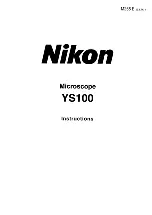
7. Focusing:
i.
Look into the eyepiece and you should see a white field image.
ii. Gently adjust the focus knob until the image of the specimen comes into a crisp focus.
Adjust light intensity on light sources to achieve best image.
CAUTION:
Always take care when focusing, so that the objective lens does not collide down on the
specimen, as you may cause damage to objective lens and/or specimen.
iii. Adjust the light intensity and/or the iris of the diaphragm as needed to achieve maximum contrast.
CAUTION:
The condenser should ideally be located with 1-3 millimeters of the bottom of specimen slide.
The height can be adjusted using condenser height knob. Be careful when adjusting that the that condenser
does not collide with the specimen, as you may cause damage to condenser and/or specimen.
8. Magnification:
i.
To change magnification, rotate the objective lens turret so that the desired objective lens is perpendicular to
the stage. Refocus as needed.
ii. The 100x objective is only designed for oil immersion microscopy, wherein the specimen and objective lens
are coated with immersion oils (not included).
9. Color filters may be used to enhance contrast, especially if using stained slides. To use the included blue color
filter, rotate the filter holder (located under the diaphragm) outwards, place the filter flat inside the top part of the
holder and then fully rotate the filter holder back into position.
Care & Maintenance:
• Please take care when using our microscope. Try to avoid bringing your microscope into contact with any dirt,
debris, dust or moisture. Place the dust cover over the microscope when not in use.
• Cleaning:
— For microscope body, unplug power and use a soft slightly damp cloth to clean dust or dirt.
— For optical surfaces, such as the eyepiece lens or objective lens, use a slightly damp microfiber cloth or Carson’s
Lens Cleaners to gently remove dust or debris.
• When not in use for long periods, it is best to store your microscope in original container.
• When moving the microscope, hold by the metal neck or base of the microscope body. Do not hold by the eye
-
piece lens, draw tube, or objective turret.
• If the focusing or mechanical stage motion becomes stiff and hard to move, these mechanical sliding portions on
the focusing track or the stage may be lubricated by using one or two drops of included oil.
Carson MS-100 Microscope Specifications:
• Monocular Inclined Tube 45°, Rotatable 360°
• Total Magnification: 40X-400X
• Coaxial Coarse and Fine Adjustment Knobs
• Eyepieces: WF10X
• Objectives: 10X, 40X, 100X OIL
• Working Stage: Double Layer Mechanical Stage, 115 mm x 125 mm
• NA1.25 Abbe Condenser, with Iris Diaphragm and Filter Holder
• Illumination: LED Electrical Illumination
Eyepiece
Objective
Total
Lens
Magnification
10x
10x
100x
10x
40x
400x
10x
100x OIL
1000x
2
Okular
360°
Drehbares
Okularrohr
Grobfokussier-knopf
Feinfokussier-knopf
Netzbuchse
(Rückseite)
Objekttisch-
einstellung
Netzschalter
Leuchtkraft-einstellung
für Lichtquelle
Standardlieferunfang:
10fach-Weitfeldokular,
Staubabdeckung, & Blaufilter
Höhen-einstellung Kondensor
(links, nicht abgebildet)
Objektiv-revolver
Seitlicher
Klemm-halter
für Objekt-träger
Objekttisch,
verstellbar
Kondensor
Irisblende
mit Blenden-
einstellung
Filterhalter
Lichtquelle
Fuß
Schnellstart-Anleitung:
1. Mikroskop auf sicherem Untergrund aufstellen.
2. Das eine Ende des Netzkabels in die Netzbuchse hinten unten ins Mikroskop einstecken, das andere Ende des
Netzkabels in eine normale 110V-Netzsteckdose stecken.
3. Das runde Ende des Okulars vorsichtig ins Okularrohr einführen.
4. Die Lichtquelle einschalten. Dazu den Netzschalter auf ON stellen.
5. Den Objektivrevolver so drehen, dass das erste Objektiv (10x, mit gelber Linie gekennzeichnet) senkrecht zum
Objektivtisch steht.
6. Den gewünschten Schnitt auf dem Objekttisch positionieren und mit dem seitlichen Klemmhalter sicher
festklemmen. Mit der Objekttischeinstellung vor/zurück (oberer Knopf) und links/rechts (unterer Knopf) den zu
betrachtenden Bereich in die Mitte des Objekttisches bringen.
BedIeNUNgSANLeITUNg | MS-100
7












